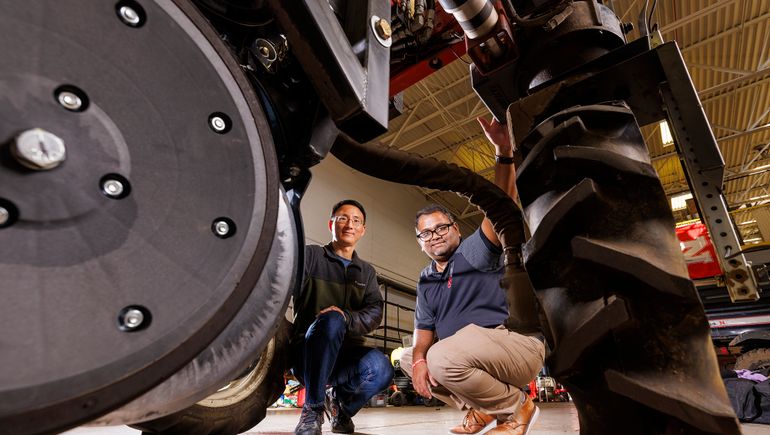Food in space? Why University of Nebraska-Lincoln wants to grow corn on Mars

The University of Nebraska-Lincoln may be close to corn fields, but soon, it could become the epicenter of far less terrestrial forms of agriculture.
Professors Santosh Pitla and Yufeng Ge are developing a Consortium of Space, Policy, Agriculture, Climate, and Extreme Environment, or SPACE². The team’s grand vision? To grow the “first acre of corn on Mars’ soil.”
Although farming in space may appear like a far-out idea, researchers believe their work could revolutionize the future of agricultural sciences.
Food for home – and beyond
To date, there’s no dedicated space-ag research center in the United States. The consortium’s founders believe that the findings from SPACE² will have far more implications than just paving the way for Mars-grown produce.
“Research into growing food in space is important for several reasons,”Ge explained. “First, we must support our astronauts as they travel, including at the international space station. There’s also value in assembling the building blocks for supporting life off Earth.”
Beyond that, space is the perfect environment for novel experiments in agriculture and advancing “the science of discovery,” Ge said.
“We want to find answers to questions like, what impacts will variables like low gravity or high temperatures have on plants?”
Earthbound farms rarely deal with these challenges. Even so, exploring their solutions may lead to unexpected breakthroughs for growing food at home, especially in an era of erratic climate change.
Today’s research, tomorrow’s breakthroughs
There’s already a precedent for applying interplanetary research at home.
“Urban farming, vertical farming, any growing system that takes place indoors, all of this relies on LED technology that came from NASA’s studies on artificial illumination, dating back decades,” Ge said. “Now, there are tons of applications for this research that we couldn’t predict when it was conducted.”
Ongoing research on improving extraterrestrial soil conditions seems especially promising for providing similar breakthroughs in the future. Mars’ soil is rich in heavy metals, and could provide insights into making agriculture more resilient as climate change impacts plant health.
“Here on Earth, salination is becoming a bigger problem,” Ge said. “If we learn how to master Moon and Martian soil, we might discover ways to apply the technology here. Is the answer algae? Microbes? It’s hard to say yet.”
Working toward a brave new future
For now, SPACE2 remains in the planning stages. Ge and Pitla are connecting with stakeholders, he U.S. Department of Agriculture, and industry players. In the long term, they hope to lead the country in cutting-edge space research that has far-reaching impacts well beyond the scientific community.
Ge believes that the University of Nebraska-Lincoln is well-positioned to pave the way for space agriculture research because of the Midwest’s role in agricultural production. Likewise, the University’s pre-established research bases in plant genetics, biochemistry, and robotics should prove invaluable for cross-discipline breakthroughs.
“Farming is a leading industry in Nebraska. Our expertise on Earth will prove valuable in space,” he said.
The consortium has already participated in several university-funded, small-scale research projects. These include growing soybeans in a lunar substrate and building an autonomous robot, Flex-Ro, that can plant and cultivate independently.
Ideally, SPACE2 will fill an ominous gap with current interstellar research priorities.
“NASA’s primary focus right now is building better rockets,” said Ge. “But food is foundational.”
Source: fooddive.com

